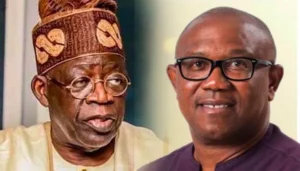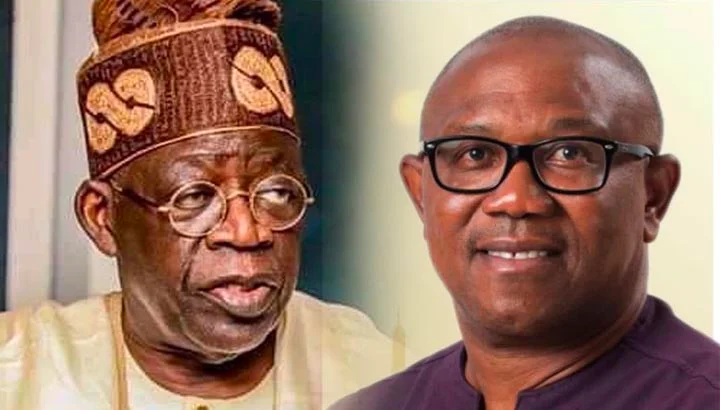
Based on the ongoing judgment hearing at the Presidential Election Petition Court PEPC in Abuja by the panel of five judges comprising four men and a woman led by Justice Haruna Tsammani.
The court, after struck out the APM’s petition that challenge the nomination of
Vice President, Kashim Shettima, proceeded with Peter Obi and Labour Party petition against Tinubu.
Peter Obi and Labour Party Petitions claimed that President Tinubu was not qualified to contest the election, citing discrepancies in his academic records and previous judicial indictment.
Obi alleged that Mr Tinubu was not eligible to contest the 25 February election after a 1993 decision of the United States District Court, Northern District of Illinois, Eastern Division, ordering him to forfeit $460,000 in a case involving drugs trafficking
Also said by failing to secure 25 per cent of the votes in the federal capital, he did not meet the full constitutional requirement to be declared the winner.
Meanwhile, Tinubu and the APC had urged court to dismiss the petitions on the grounds that they were founded on wrong legal interpretations while the petitioners also failed to provide evidence to substantiate alleged irregularities and results manipulations.
Things you should know ahead of Obi – Tinubu final verdict
The ruling monitoring buy IdanNews correspondent noted that Justice Haruna Tsammani, the head of the panel of five judges, during the hearing give remarked on notable key issues of the petition that gives signer to the hearing direction:
The court rejects 10 out of 13 witnesses presented by Mr Obi. Said their witness statements on oath are not filed with the petition.
Mr Tsammani says Mr Obi called 13 witnesses who testified as PW1 to PW13.
Of the 13 witnesses, only three are their witnesses whose statements on oath were filed along with the petition.
The remaining 10 witnesses were subpoenaed and their witness statements on oath were only filed after hearing started.
He notes that the respondents challenged the competence of the petitioners’ witnesses whose witness statements were not frontloaded.
The judge also said by virtue of section 285 of the Nigerian constitution, section 137(7) of the Electoral Act 2022, and other provisions, every witness statement on oath must be filed along with the petition.
He noted that based on the Supreme Court authority, once the 21 days window for filing an election petition lapses, the content of the petition cannot be amended.
He further that no additional statement on oath can be filed after the close of the window since the respondents would not have the opportunity to respond to it.
Mr Tsammani stated that the petitioners were aware of the legal provision relating to the filing of witness statements on oath yet went ahead to present 10 witnesses without their witness statements on oath earlier filed with the petition.
The court then rejects 10 out of 13 witnesses presented by Mr Obi.
The PEPC rejected the reports of forensic analyses tendered by the three witnesses
The presidential election court also rejected the reports of forensic analyses tendered by the three witnesses of the Labour Party for either being made during the pendency of the case or made by an interested party who would benefit from the outcome of the petitions.
The court also rejects the European Union report on the 25 February presidential election on the grounds that they were not tendered by an official of the body which is the author and has the custody of the document.
Court rejects evidence tendered by Mr Obi’s web engineer, Mpeh Ogar, regarding a technical glitch observed on INEC Results Viewing portal on the election day.
Mr Tsammani upholds respondents’ objection to the admissibility of evidence tendered by Mr Obi’s web engineer, Mpeh Ogar, regarding a technical glitch observed on INEC Results Viewing portal on the election day.
The judge held that Ms Ogar was an interested party in the petition having vied for elective office at the polls on the platform of the Labour.
Alleged over-voting in some state lack merit without specific polling units and figures – judge Tdammani
Mr Tsammani says the petitioners’ allleged over-voting in some states but failed to specify the particular polling units where the alleged malpractices took place.
The petitioners failed to state the specific figures they scored at the units.
He restates that Mr Obi only made generic allegations of irregularities without specifying the particular polling units.
He says the petitioners have no justifiable reasons not to specify the polling units since their agents were present at all polling units and received duplicate copies of the result sheets
Court rules against blurred 18,000 results sheets allegations for not specified polling units they were meant for
The court says the issue of blurred 18,000 results sheets alleged by the petitioners is misconceived as they were unable to state the specific polling units they were meant for.
Mr Tsammani then begins considering the merit of Mr Obi’s petition.
Further, On the tendering of Tinubu’s academic record from the Chicago State University and the US embassy letter to the Nigerian police clearing Mr Tinubu of any criminal record in the US, the court dismisses Mr Obi’s objections to the admissibility of the documents.
Court ruleout Obi allegation of non-qualification of TInubu based on his alleged criminal record in the US. Says Obi failed to provide evidence to prove his claimed
Justice Tsammani says the operative words used in the section 137(1) of the Nigerian constitution cited by the petitioners sentence: “sentence”, imprisonment” and “fine”.
Notes that the judgement of US District in Northern Illinois which ordered the forfeiture of Mr Tinubu’s $460,000 in a drugs-related case was in civil proceedings in which Mr Tinubu was not a party.
He cites an exhibit tendered by Mr Tinubu’s legal team which was a letter written by the US embassy stating that Mr Tinubu had no criminal record in the US.
Tsammani however also holds that there was no certificate from US authorities required to support any judgement issued by a foreign court to be enforceable in Nigeria as stipulated in the Nigerian constitution.
The court holds that the US court’s order of forfeiture of $460,000 over drug trafficking in the US was in the context of a criminal conviction.
It says Mr Obi failed to show Mr Tinubu is disqualified from contesting the election on that basis.
The court noted that the petitioners have the burden to prove their allegation of criminal conviction against the second respondent (Mr Tinubu), but they have evidently failed to prove the allegation.
The court then says, from all the foregoing, Mr Tinubu was not disqualified from contesting the February presidential election. Consequently.
The court struck out the implication of INEC’s failure to promptly upload the photographic election result sheets to IReV. Says there is nothing in the regulation to show that the “BVAS must electronically transmit polling units results”
The court dismisses the second issue of non-transmission of result sheets to IReV.
The court holds that there is no law that says INEC must mandatorily transfer or transmit the results of the election from the polling units electronically.
It says the law empowers INEC to decide the means of collation of the results of elections in Nigeria.
However on the issue of the allegation of INEC non-compliance with the provision of the Electoral Act in the conduct of the election, citing INEC’s failure to electronically transmit the results of the election.
Justice Tsammani says Mr Obi is “estopped” (prohibited) from raising the issue again after it was resolved by the Federal High Court.
Says the only technological device that is mandatory for INEC to use for the election is the Bimodal Voters Accreditation System (BVAS), M Tsammani says
He adds that there is nothing in the regulation to show that the BVAS must electronically transmit polling units results.
The court says both Electoral Act and INEC regulations provide for manual collation of results, and electronic transmission is at best optional.
The justice says Mr Obi failed to establish that INEC deliberately refused to promptly upload polling unit results to IReV in order to manipulate the results in favour of Mr Tinubu.
Peter Obi’s web engineer’s evidence concerning IReV portal glitches, added no value to the petitioners’ case. The court adds that the witness’ documentary evidence was unsigned.
